Looking for the Best Phosphate Binders for Cats? Managing your feline friend’s health, especially if they have kidney issues, is of utmost importance. Elevated phosphate levels can further complicate kidney conditions, but fortunately, phosphate binders can help. These products play a vital role in maintaining balanced phosphate levels, promoting better kidney function and overall well-being for your cat. In this article, we will guide you through the top phosphate binders on the market, ensuring your feline companion receives the best care possible. Let’s delve into the options and understand their benefits.
1. Epakitin – 60 grams
Epakitin is a chitosan-based phosphate binder that is designed to support renal function in dogs and cats. It contains chitosan, calcium carbonate, lactose, and hydrolyzed soy protein, which provide natural support for normal kidney function and health. This easy-to-administer powder can be used alongside kidney support diets to help manage phosphate levels and reduce serum phosphorus, urea, and creatinine levels. Furthermore, it is aluminum hydroxide-free.
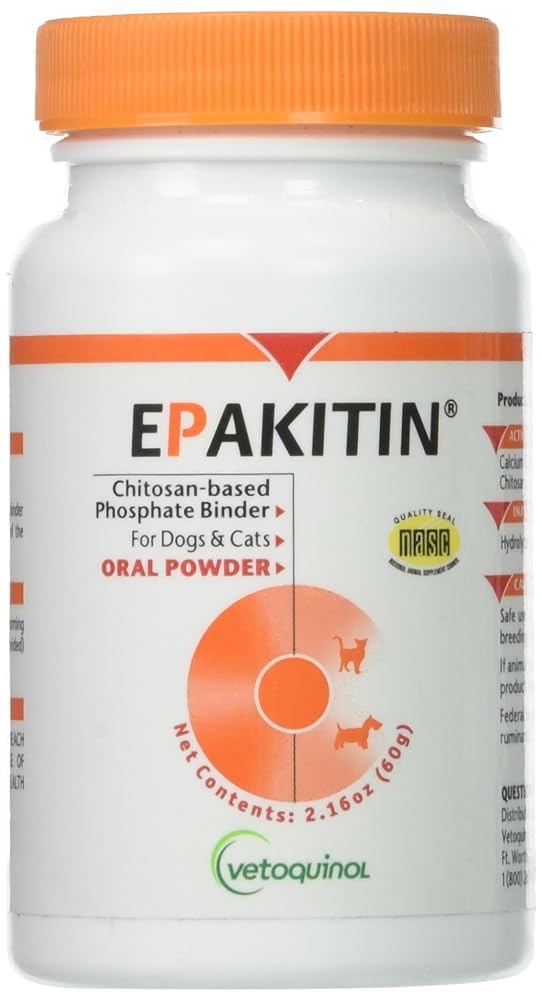
2. Rx Vitamins for Pets Phos-Bind for Dogs & Cats – Supports Normal Function & Health of Kidneys
Rx Vitamins for Pets Phos-Bind is a powdered supplement designed to support the normal function and health of kidneys in both dogs and cats. It aims to help regulate phosphate levels in the body, which can be beneficial for pets with kidney issues. The product comes in a 200 g powder form, providing convenience for pet owners to incorporate into their pets’ diet.
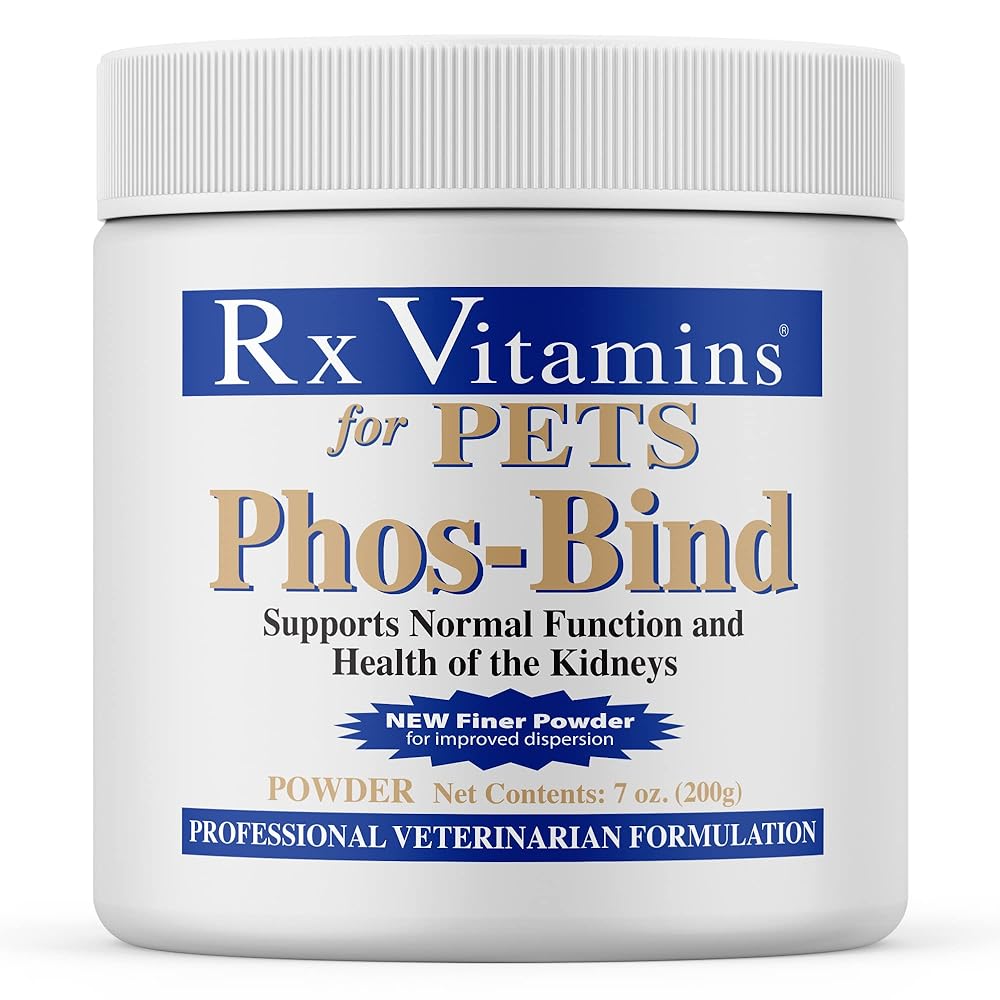
3. Rx Phos-Flush Phosphate Binder. Extra Large 200 Grams
The Rx Phos-Flush Phosphate Binder is an all-natural supplement designed to support proper kidney function in cats and dogs. Its proprietary formula includes kidney protecting phosphate binders such as chitosan, calcium carbonate, and Aluminum Hydroxide, which work to attract, soak up, and flush out phosphates through the digestive tract. It is veterinarian recommended and can aid with various issues such as urination control, hydration levels, appetite increase, and skin and coat health. Additionally, this supplement is said to quickly reduce pain from renal complications and offers a satisfaction guarantee.
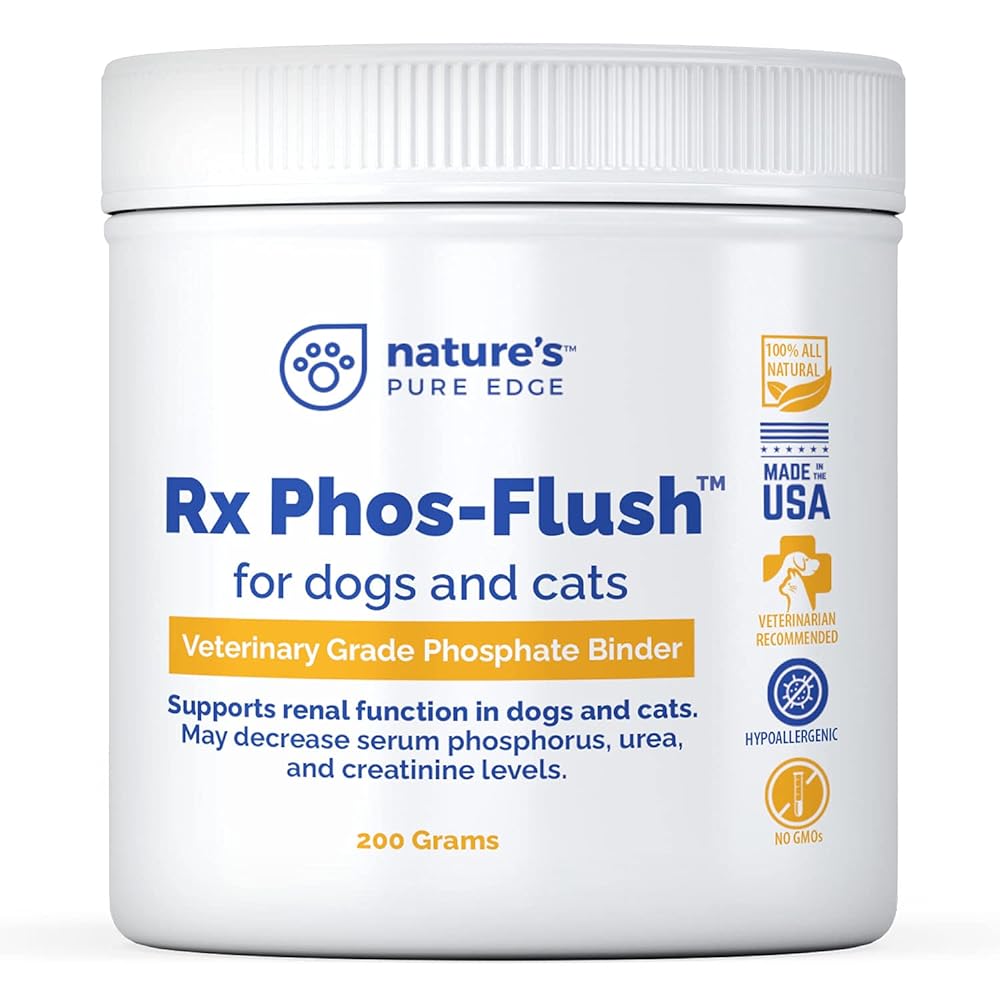
4. Trukitin Chitosin Based Phosphate Binder for Cats & Dogs
Trukitin is an oral powder nutritional supplement that supports normal kidney function and health in dogs and cats. It contains chitosan, calcium carbonate, lactose, and hydrolyzed soy protein. When used in conjunction with renal diets, Trukitin may help decrease serum phosphorus levels and urea and creatinine levels. It is aluminum hydroxide-free and made in the USA in registered facilities, undergoing independent testing for safety and purity.
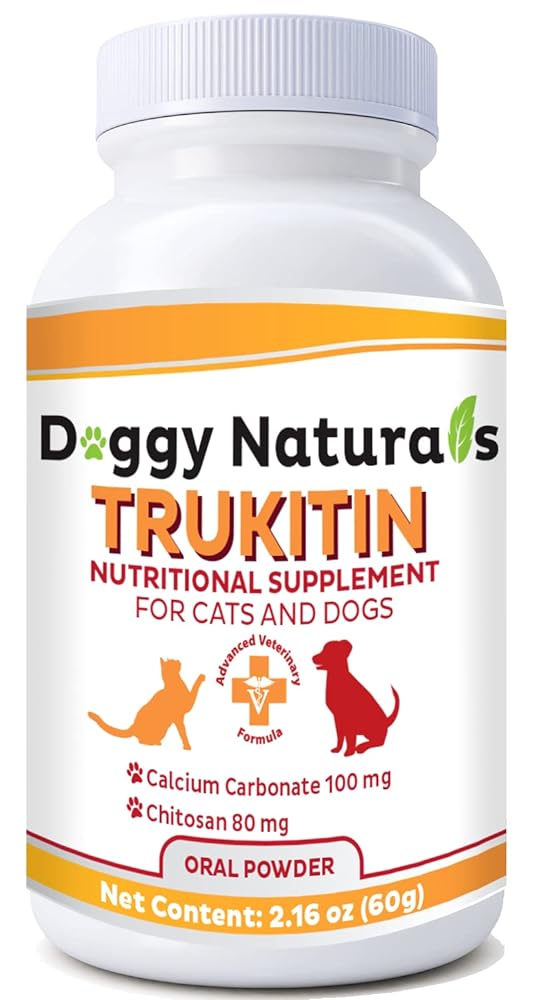
5. Nutramax NARAQUIN™ Dietary Phosphate Binder + Renal Support Supplement
Nutramax NARAQUIN is a dietary phosphate binder and renal support supplement for cats and dogs. It is formulated with a blend of three effective phosphate binders to bind intestinal phosphorus. The supplement also includes omega-3 fatty acids to support renal health and beta glucans to help modulate oxidative stress. Nutramax Laboratories Veterinary Sciences, a trusted pet health company, backs the product, ensuring that it is made with high-quality ingredients. NARAQUIN is easy to administer as it comes in sprinkle form and can be added to food.
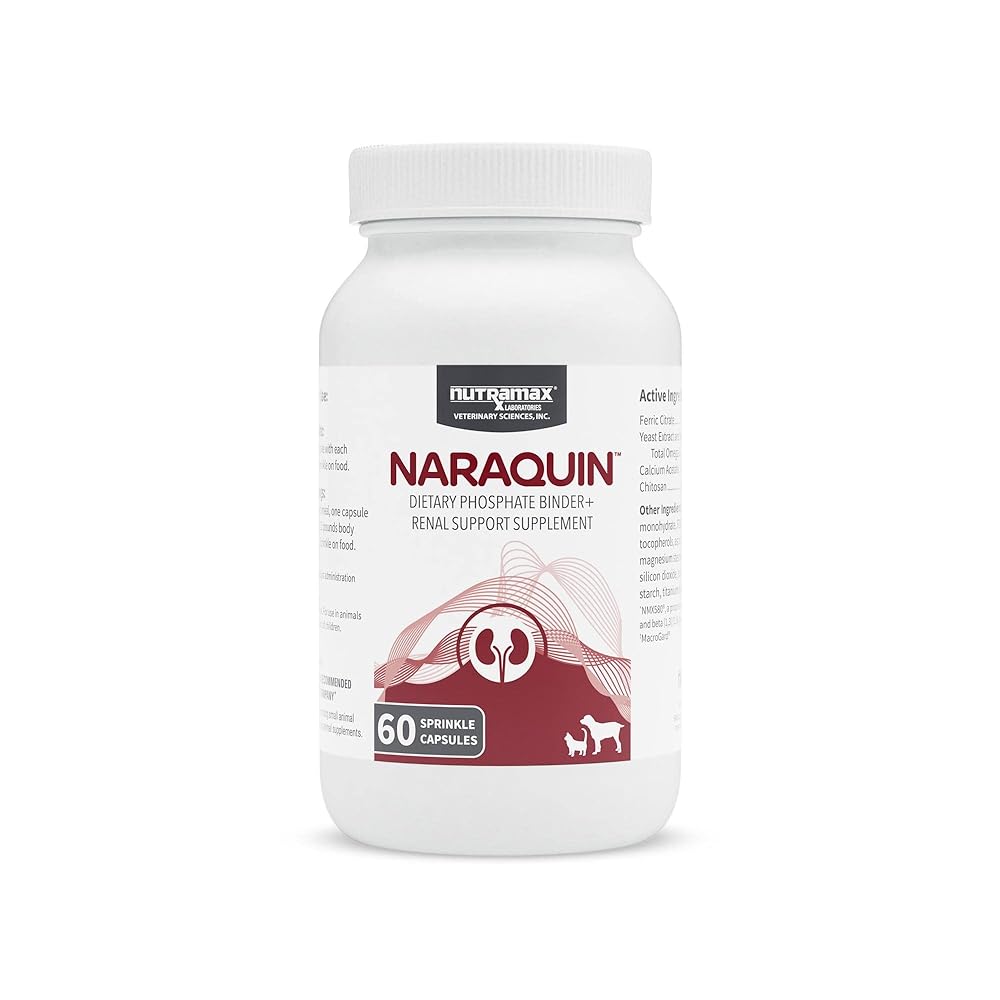
6. RENARAMAX Dietary Phosphate Binder for Cats & Dogs and Renal Support Supplement Powder for Pets
The RENARAMAX Dietary Phosphate Binder for Cats & Dogs is a supplement formulated to improve the quality of life in pets by binding intestinal phosphorus. It contains a proprietary blend of three effective phosphate binders, as well as two renal support supplements, Omega-3 Fatty Acids and Beta Glucans. RENARAMAX also supports renal health and helps modulate oxidative stress in pets. It is available in a sprinkle form, making it easy to administer with the included scoop.
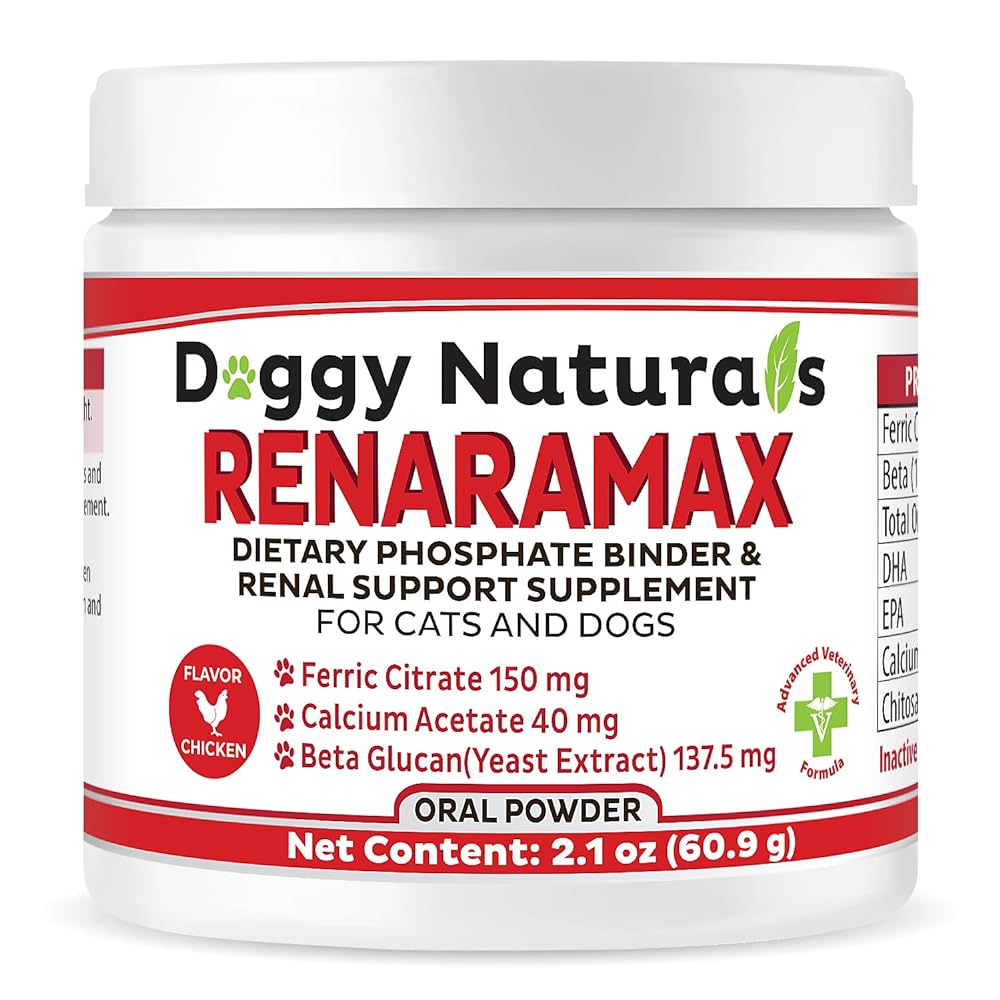
What Are The Benefits of a Phosphate Binder for Cats? When Should I Give One?
Benefits of a Phosphate Binder for Cats:
- Regulate Phosphate Levels: Cats with chronic kidney disease (CKD) often struggle to excrete phosphate, leading to elevated blood phosphate levels. Phosphate binders help reduce the absorption of phosphorus from the intestines, thus keeping blood levels in check.
- Kidney Health Support: Elevated phosphate levels can exacerbate kidney damage. By controlling these levels, you can potentially slow the progression of CKD and improve the quality of life for your feline friend.
- Alleviate Clinical Signs: High phosphate levels can contribute to secondary conditions like renal secondary hyperparathyroidism. By reducing phosphates, you can alleviate some associated clinical signs like bone pain or soft tissue mineralization.
- Dietary Flexibility: While therapeutic renal diets are typically low in phosphorus, some cats may resist such dietary changes. Phosphate binders can offer some flexibility, allowing for a broader range of acceptable foods while still managing phosphate levels.
When Should I Give One?
- Chronic Kidney Disease: If your cat has been diagnosed with CKD and blood tests indicate elevated phosphate levels, your veterinarian may recommend a phosphate binder.
- Dietary Concerns: If your cat is on a diet that is higher in phosphorus and you’re unable to transition them to a more appropriate renal diet, a phosphate binder may be advised.
- Veterinarian Recommendation: Always consult with your veterinarian before starting any medication or supplement. They will provide guidance based on blood tests, the stage of CKD, and the overall health of your cat.
Frequently Asked Questions About Phosphate Binders for Cats
1. What are phosphate binders, and how do they work in cats?
Phosphate binders are medications that help reduce the absorption of phosphorus from the intestines. By binding to dietary phosphate in the gastrointestinal tract, these binders prevent its absorption, helping to control blood phosphate levels in cats with conditions like chronic kidney disease (CKD).
2. Why might my cat need a phosphate binder?
Cats with CKD often have trouble excreting phosphates, leading to elevated blood phosphate levels. High phosphorus levels can further damage the kidneys and lead to secondary conditions. Phosphate binders help regulate these levels, supporting kidney health.
3. Are there any side effects associated with phosphate binders?
Some cats might experience gastrointestinal issues like constipation, diarrhea, or decreased appetite when on phosphate binders. It’s essential to monitor your cat for any adverse reactions and consult your veterinarian if concerns arise.
4. How do I administer phosphate binders to my cat?
Phosphate binders are typically given orally, often mixed with food for easier administration. Always follow your veterinarian’s dosing recommendations and ensure your cat consumes the entire portion to get the full dose.
5. Can I give my cat phosphate binders without a vet’s prescription?
It’s crucial to consult with a veterinarian before starting any medication, including phosphate binders. They will determine the necessity, provide the appropriate dosage, and monitor your cat’s response.
6. How often should my cat take phosphate binders?
The frequency varies based on the product and your cat’s specific needs. Typically, binders are given with meals to prevent phosphate absorption from food. Your veterinarian will provide a specific regimen.
7. Can phosphate binders be given with other medications?
While many medications can be given alongside phosphate binders, there can be interactions. Always inform your vet of all medications and supplements your cat is taking to avoid potential conflicts.
8. Will phosphate binders cure my cat’s kidney disease?
No, phosphate binders are not a cure. They are a management tool to control phosphate levels and potentially slow the progression of CKD, improving the cat’s quality of life.
9. How will I know if the phosphate binder is working?
Regular blood tests will monitor your cat’s phosphate levels. A successful reduction in these levels typically indicates the effectiveness of the binder. Additionally, improvements in clinical signs or overall well-being can be positive indicators.
10. Are there different types of phosphate binders?
Yes, various phosphate binders differ in active ingredients and efficacy. Common types include aluminum-based, calcium-based, and non-metal-based binders. Your veterinarian will recommend the most suitable option for your cat.
Final Summary: The Best Phosphate Binders for Cats
In this article, we reviewed the Best Phosphate Binders for Cats. Ensuring your cat’s phosphate levels are well-regulated is crucial, especially for those with kidney concerns. With the right phosphate binder, you can help alleviate some of the burdens on their kidneys, improving their overall health and quality of life. As always, before introducing any new supplement or medication, consult with your veterinarian to make the best decision for your furry friend. Your cat’s well-being is paramount, and with the right care, they can lead a more comfortable and healthy life.




